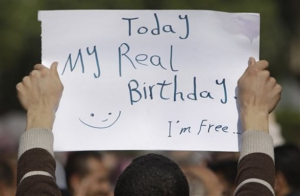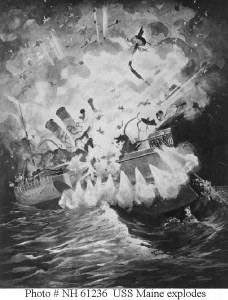Pick one question from the following choices below and submit your answer by class on Monday, March 7. Let’s shoot for 300 words minimum. Dig deep!
1. During the suffragist movement, many women were arrested while demonstrating in front of the White House on charges of “obstructing traffic.” Do you think that this charge legitimate? Why or why not? Also, is it possible that by arresting these women that the government was violating their First Amendment rights (i.e. freedom of speech)? Why or why not? – Ellen
2. Do you believe it was right for Roosevelt to take advantage of the revolution in Panama to get the Canal. Was it worth to help this country? Would you have done the same if you were in Roosevelt’s position? Why or why not? – Brendan
3. Consider the following scenario: It is 2008; John McCain and Barack Obama are the two main party candidates and you can vote. A Rooseveltian candidate created a third party with a platform similar yet more drastic than the one you had planned on supporting much like what had happened in 1912. Who would you vote for? Why? – Saul
4. Today, there is a little known world-wide company called Unilever. Unilever is a British/Dutch company that owns most of the world’s home, beauty and food brands. They control more than 400 brands and millions of popular products like Axe deodorent, Dove soap, Pond’s cold cream, Suave shampoo, Vaseline petroleum jelly, Signal toothpaste, Surf laundry soap, Slim Fast weight loss foods, Lipton tea, Ben & Jerry’s ice cream, Breyers ice cream, and Country Crock margarine. With all this success they take advantage, just like the monopolies and trusts that Teddy Roosevelt busted. They have been proven to use child labor, (what we would consider) racist ad campaigns in foreign countries, degrading ad campaigns in America and animal testing. They have been accused o f being a monopoly multiple times but have also been defended because they have “competitors” like Procter and Gamble and Nestle.
f being a monopoly multiple times but have also been defended because they have “competitors” like Procter and Gamble and Nestle.
Do you think Unilever is a monopoly? Why or why not?
Do you think it is dangerous to have this big of a company with this many popular products? Why or why not?
Supposing Unilever is a monopoly, what can we do to fix it today? Explain. – Riley
5. Woodrow Wilson’s campaign slogan in 1916 was “He kept us out of war.” However, less than half a year after he was elected on this mantra, Wilson asked Congress to declare war, and on April 6, 1917, they obliged. Although he didn’t want to, Wilson broke his campaign promise, similar to many politicians today. What could Wilson have done differently so that the United States wasn’t forced into war?
– Also, do you think that modern-day politicians make promises just to get elected, knowing that they will break them later on? Or do they whole-heartedly support these causes and are prevented from following their planned course of action as Wilson was? Are both plausible or is there an additional explanation? Please explain. – Andrew
6. During the Gilded Age, powerful men dominated American business. They built huge companies and helped the society with its outcome. Carnegie’s Steel Company was created in 1870 and soon became the one of the largest and most profitable industrial enterprises in the world. The company was sold in 1901 to J.P Morgan for $480 millions. Did these decisions change our society as we know it? If you could be any important figure at the time, what would you have changed ? Would you have done more or less than what the person originally had done? Why? – Ophelie
7. If you were a Cuban during the Spanish-American war, would you have trusted America’s motives? Why or why not? How would you have reacted to the Platt and Teller Amendments? Explain. – Philip
8. As we have all seen in the news lately there are many protests and revolts in Middle Eastern countries. Egypt just successfully overthrew its leader Hosni Mubarak. There are now protests in Libya, Yemen, Tunisia, and the ongoing struggle in Israel. The U.S. has been very active in this area of the world, especially in Iraq and Afghanistan. But we did this to take out Al-Qaeda and others “terrorists”. This new development of people over throwing their governments is very different than American imperialism. Americans believe that we should have the right to over throw our own government if it becomes tyranical – it’s written into the Declaration of Independence.
Do you believe that we should help these rebels to overthrow their oppressive governments, or should we leave them alone and see what happens? Why or why not? Or is there a different approach? – Sam
http://www.npr.org/2011/02/27/134111470/In-Libya-Radio-Tobruk-Issues-Rallying-Cry
There are a ton of great links on the North
Newsweek’s “Why Americans Love Revolutions” – http://www.newsweek.com/2011/02/27/un-american-revolutions.html#
9. Do you agree with TR’s assessment of Taft when TR said that Taft was a status quo president who went along with what Congress said? Why or why not? Also, do you agree with TR running for a 3rd term to spite Taft even if they both lost? Why or why not? – Dorian
10. For a long time, the iPhone was only available on AT&T, raking in massive fortunes for both companies. Many phones are only available on certain networks, many clothing brands are only available at certain stores–do these arrangements/exclusive rights resemble trusts? Why or why not? Should any product be able to be sold by any company to prevent this? Or if a company invented a popular product, do you think that company should at least be able to sell the product for a few years without competition? Why or why not? – Calvin

11. Back during the Imperialism era and even today, most of the important decisions that occur in the United States, are debated in Congress.
Even though we [citizens] think we have a say in what goes on in Washington, many times, the final decision is made by politicians. In many cases during imperialism in America, such as when the U.S. liberated Cuba of Spanish rule, and when the Philippines were liberated, do you think that there should be a vote to invade or not and the flat results are the one and only deciding factor whether to invade or not? Also, do you feel like there should be a system in place, today, where the people have more say on issues in Congress? Please explain. – Brad
12. Do you think the Espionage Act of 1917 and the Sedition Act of 1918 where necessary during America’s first major war since 1865 or were they pointless breaches of 1st Amendment rights? Why? Could there have been a middle ground somewhere? If so, what? If not, why not? – Michael
13. If you lived back before the passage of the 19th Amendment, would you ever become a women suffaragist? If so, why? If not, why? Also, what organization (National Woman’s Party, or NAWSA) would you join and why? – Cierra

This really isn't a photo but a photo of a drawing.
14. What do you think was the real reason that America went to war in 1898 with the Spanish? Was it either a general desire for war (to avenge the bombing of the Maine)? Were there humanitarian reasons? “Large Policy” or “Formal” Imperialism? Or was it to expand and meet our economic needs? Choose one of the four and explain why. – Devon
15. Why do you think the American people were so against America’s involvement in the Great War in 1917? If you were alive back then, would you have been against it? Why or why not? – Drew H.
16. Who are some examples of women activists in today’s society? Have we (women) truly acheived equality after all these years? Why or why not? – Emily
17. Compare the labor riots of 1919-1920 in America and the riots / protests occurring in Egypt, Libya, Tunisia and Saudi Arabia going on today and how the government responded to both. Why did both the Middle Easterners and laborers rebel against conditions and treatment? – Lenny

18. Though President Wilson was quite the “timid” pacifist, he often went over senators’ heads to ask for the opinion of the sovereign people. Why do you think he did this repeatedly? Do you think going over the senators’ heads contributed to his fall from grace in Paris and during the League of Nations rallies? Explain. – Erin
19. Alexander Graham Bell invented the telephone, and Thomas Edison invented the light bulb. Can you name 2 other inventors whose inventions have greatly impacted life in America? Please name both inventors, what he/she had invented, and how it has impacted America. – Brittany

 f being a monopoly multiple times but have also been defended because they have “competitors” like Procter and Gamble and Nestle.
f being a monopoly multiple times but have also been defended because they have “competitors” like Procter and Gamble and Nestle.


